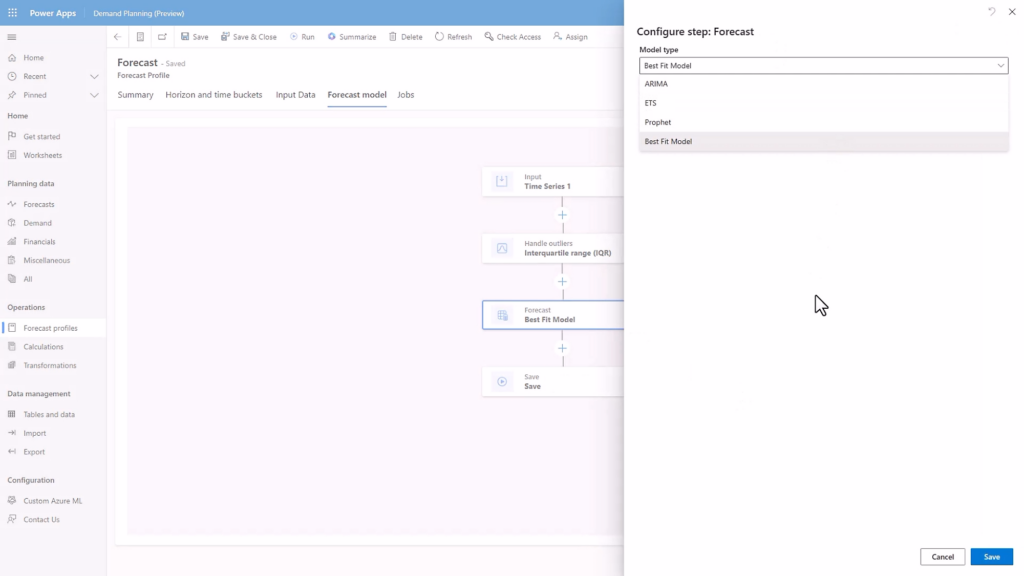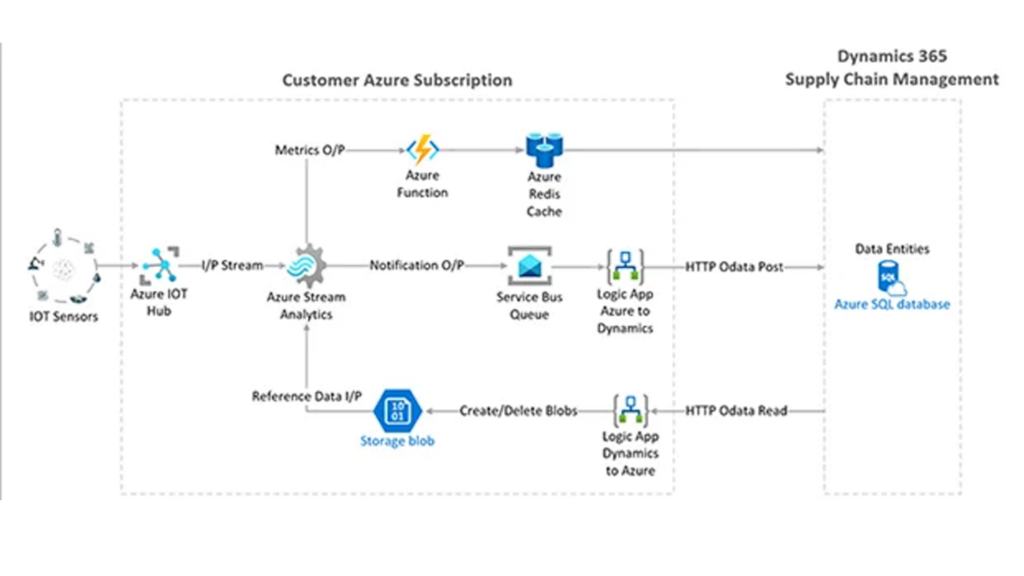Introduction

In today’s fast-paced business world, supply chain management (SCM) plays a vital role in ensuring the smooth flow of goods and services from manufacturers to consumers. Efficient SCM is essential for successful businesses as it helps them meet customer demands, minimize costs, and maintain a competitive advantage.
Supply Chain Management involves the strategic planning and oversight of all activities related to sourcing, procurement, production, and logistics. It also entails coordination and cooperation with channel partners, including suppliers, intermediaries, third-party service providers, and customers. Essentially, SCM integrates supply and demand activities within and across companies.
Microsoft Dynamics 365 Supply Chain Management (SCM) is a robust enterprise resource planning (ERP) solution designed to enhance and streamline the supply chain operations of businesses. By leveraging advanced technologies and comprehensive functionalities, Dynamics 365 SCM helps organizations achieve greater efficiency, visibility, and flexibility in their supply chain processes.
Understanding Microsoft Dynamics 365 Supply Chain Management

What is Microsoft Dynamics 365 SCM?
Microsoft Dynamics 365 Supply Chain Management is an integrated solution that provides end-to-end visibility and control over the entire supply chain. It helps businesses manage production, inventory, logistics, and distribution processes seamlessly, enabling them to optimize their operations and drive growth.
Key components and modules
Production Planning and Control
- Demand Forecasting: Predict future demand using historical data and advanced algorithms.
- Production Scheduling: Optimize production schedules to maximize efficiency and minimize downtime.
- Resource Management: Allocate resources effectively, ensuring that equipment and labor are utilized optimally.
Inventory Management
- Real-Time Inventory Tracking: Monitor real-time inventory levels to avoid stockouts and overstock situations.
- Warehouse Management: Streamline warehouse operations with picking, packing, and shipping tools.
- Inventory Optimization: Use AI-driven insights to maintain optimal inventory levels, reducing carrying costs.
Logistics and Transportation
- Transportation Management: Plan and execute transportation processes, including carrier selection and route optimization.
- Freight Management: Manage freight operations, including tracking and cost control.
- Logistics Analytics: Gain insights into logistics performance to identify areas for improvement.
Supply Chain Planning
- Sales and Operations Planning (S&OP): Integrate sales and operations planning to align production with market demand.
- Master Planning: Create master plans to coordinate production, procurement, and distribution activities.
- Vendor Collaboration: Enhance collaboration with suppliers through real-time communication and data sharing.
Quality Management
- Quality Control: Implement rigorous quality control processes to meet product standards.
- Compliance Management: Ensure compliance with industry regulations and standards.
- Traceability: Track products throughout the supply chain to ensure transparency and accountability.
Key Features of Microsoft Dynamics 365 Supply Chain Management
Microsoft Dynamics 365 Supply Chain Management represents a robust solution crafted to streamline all facets of supply chain operations. In the following discourse, we shall explore the pivotal functionalities that render it an essential resource for enterprises seeking to elevate operational efficiency, curtail expenditures, and attain heightened authority over their supply chains.
Production Planning and Control
Forecasting Demand
Microsoft Dynamics 365 Supply Chain Management leverages advanced algorithms and historical data to provide accurate predictions of future demand. This functionality empowers businesses to anticipate market requirements, enabling proactive adjustments to production schedules and mitigating both overproduction and stockouts.
Scheduling Production
Effective production scheduling is paramount in minimizing downtime and maximizing output. Microsoft Dynamics 365 Supply Chain Management offers tools for creating optimized production schedules that align with demand forecasts, resource availability, and production capacities.
Managing Resources
Optimal resource management is essential for maximizing productivity while minimizing waste. With Dynamics 365 SCM, businesses can allocate resources efficiently, ensuring the optimal utilization of equipment, labor, and materials.
Inventory Management
Real-Time Inventory Tracking
With real-time inventory tracking, businesses can monitor stock levels continuously. This feature helps prevent stockouts and overstock situations by providing accurate, up-to-the-minute data on inventory status.
Warehouse Management
Microsoft Dynamics 365 Supply Chain Management offers robust warehouse management capabilities, streamlining operations such as picking, packing, and shipping. This leads to faster order fulfillment and improved customer satisfaction.
Inventory Optimization
Using AI-driven insights, Microsoft Dynamics 365 Supply Chain Management helps businesses maintain optimal inventory levels. This reduces carrying costs and ensures that the right amount of stock is available to meet demand without excess.
Logistics and Transportation
Transportation Management
Transportation management is simplified with Microsoft Dynamics 365 Supply Chain Management, which helps in planning and executing transportation processes efficiently. Features include carrier selection, route optimization, and real-time tracking of shipments.
Freight Management
Effective freight management controls shipping costs and improves delivery times. Microsoft Dynamics 365 Supply Chain Management offers tools to manage freight operations, track shipments, and analyze freight costs for better decision-making.
Logistics Analytics
Logistics analytics provide insights into the performance of transportation and logistics operations. This feature helps identify areas for improvement, optimize logistics processes, and enhance overall efficiency.
Supply Chain Planning
Sales and Operations Planning (S&OP)
S&OP integration aligns production plans with sales forecasts. This ensures that production activities meet market demand, reducing the risk of excess inventory or stockouts.
Master Planning
Master planning coordinates production, procurement, and distribution activities. Dynamics 365 SCM helps create comprehensive plans that ensure all supply chain components work harmoniously.
Vendor Collaboration
Improving collaboration with suppliers is key to a smooth supply chain. Dynamics 365 SCM enhances vendor collaboration through real-time communication and data sharing, ensuring timely delivery of materials and components.
Quality Management
Quality Control
Rigorous quality control processes are essential for maintaining product standards. Dynamics 365 SCM includes features for implementing and monitoring quality control measures throughout the supply chain.
Compliance Management
Compliance with industry regulations and standards is crucial for avoiding legal issues and maintaining market reputation. Dynamics 365 SCM helps businesses ensure compliance by integrating regulatory requirements into their operations.
Traceability
Traceability is vital for transparency and accountability in the supply chain. Dynamics 365 SCM enables businesses to track products from origin to final delivery, ensuring that all stages of the supply chain are visible and verifiable.
Benefits of Using Microsoft Dynamics 365 Supply Chain Management
Improved Efficiency
Streamlined processes and optimized resource utilization lead to higher efficiency and productivity.
Enhanced Visibility
Real-time data and analytics provide greater visibility into supply chain operations, enabling better decision-making.
Cost Reduction
Efficient inventory management and optimized logistics reduce operational costs.
Agility and Flexibility
The ability to respond quickly to market changes and demand fluctuations ensures business agility.
Scalability
Suitable for businesses of all sizes, Dynamics 365 SCM can scale with your business growth.
Future Trends in Supply Chain Management and Microsoft Dynamics 365
Artificial Intelligence (AI) and Machine Learning
Enhanced Demand Forecasting
AI and machine learning are revolutionizing demand forecasting by analyzing vast amounts of data to predict future demand with high accuracy. Dynamics 365 SCM leverages these technologies to provide businesses with actionable insights, allowing for better planning and resource allocation.
Predictive Maintenance
AI-driven predictive maintenance helps businesses anticipate equipment failures before they occur. Dynamics 365 SCM uses machine learning algorithms to analyze data from IoT sensors, predicting when maintenance is needed and reducing downtime and repair costs.
Cloud-based Technology Supply Chain Trends
According to the stats and research, cloud technology in Supply Chain management will surpass 40$ Billion by 2027
The substantial shift in traditional supply chain management trends is justified by the ability of cloud-based solutions to provide companies with actionable insights. This enables better decision-making, analysis of what is appropriate for company growth, and much more. Let’s delve into how cloud-based technology is revolutionizing business operations.
- Garnering intelligent insights from customers, retailers, wholesalers, etc.
- Planning logistics management, inventory, and transport management efficiently.
- Insights on sourcing and procurement, as cloud-based solutions can curate a master insightful database of all the suppliers.
- Save costs as cloud-based technology doesn’t require any charges; it is subscription-based.
- Improve scalability during high and unmanageable demands.
Internet of Things (IoT) Integration
Real-Time Tracking and Monitoring
The integration of IoT devices allows for real-time tracking and monitoring of assets throughout the supply chain. Dynamics 365 SCM harnesses IoT technology to provide businesses with real-time data on inventory levels, shipment status, and equipment health, enhancing visibility and control.
Smart Warehousing
IoT-enabled smart warehousing optimizes warehouse operations by automating processes such as inventory management, picking, and packing. Dynamics 365 SCM supports IoT integration, enabling businesses to create efficient, automated warehouses that reduce labor costs and improve accuracy.
Digital Supply Chain Management Trends
According to Gartner, implementing digital transformation in the supply chain can increase revenue by 20% and lead to a 50% reduction in costs.
Digital transformation is now a widely discussed topic because it is considered essential. Previously, the quoting process with multiple suppliers was time-consuming, but we now have a quicker turnaround time with digital solutions.
Issues such as disruptions in quality and control can be efficiently managed. The ability to access a team from anywhere in the world ensures that quality and control are maintained. Managing vendors overseas is becoming simpler with the latest digital supply chain management trends, and there are other significant advantages as well. These include:
- Real-time functionality, accelerates innovation and reduces time to market.
- Better decision-making through integrated IT and informational technology, enabling the prediction of risks.
- It has increased productivity and efficiency through digital supply chain trends.
- Reduced costs through accurate forecasting, maximizing productivity and efficiency, leading to quicker access and lower costs.
- Digital amplification improves customer satisfaction by managing and responding to customers promptly.
The ever-increasing demand for digital solutions from customers means that the trends in digital supply chain management are here to stay.
Advanced Analytics and Big Data
Data-Driven Decision Making
The ability to analyze large volumes of data quickly and accurately is transforming supply chain management. Dynamics 365 SCM utilizes advanced analytics and big data to provide insights that drive informed decision-making, helping businesses optimize their supply chain strategies.
Customer Insights
Understanding customer behavior is essential for aligning supply chain operations with market needs. Dynamics 365 SCM uses big data analytics to generate customer insights, allowing businesses to anticipate demand and tailor their offerings accordingly.
Conclusion
Microsoft Dynamics 365 Supply Chain Management provides a comprehensive range of features to help businesses optimize their supply chain operations. From production planning and inventory management to logistics, supply chain planning, and quality management, Dynamics 365 SCM offers the necessary tools to boost efficiency, cut costs, and enhance overall supply chain performance. Leveraging these features can result in notable competitive advantages in today’s rapidly changing business landscape